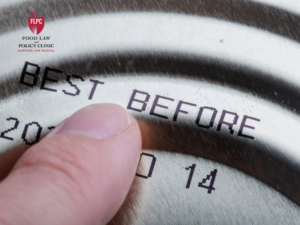This post was written by Lauren Limbach, a law student in the Food Law and Policy Clinic.
On October 26th, Senators Durbin (D – Illinois) and Grassley (R – Iowa) introduced the Reduce Food Loss and Waste Act (SB 3146), which would create a voluntary certification program entitled the Food Loss and Waste Reduction Certification Program. The certification would be available to organizations that incorporate efforts to mitigate food loss and waste into their business model.
The primary goals of the bill are to reduce food loss and waste and strengthen the pipeline of food donation and reuse in place of food disposal. If passed, the bill would task the Secretary of Agriculture with setting standards that organizations must meet to be eligible for the certification. These criteria would include a requirement that organizations submit data detailing the amount of food waste that the organization donates versus disposes. However, the complete suite of criteria required for certification would be determined by the Secretary of Agriculture during the rulemaking process. Therefore, additional data collection with respect to other forms of food waste mitigation (upcycling to human products, generating animal feed, fuel production, etc.) may be included in the final criteria.
The Secretary of Agriculture would also be responsible for setting up a third-party certification system in which approved third-party certification bodies would review applicants to determine if they are eligible for certification. The bill directs the Secretary of Agriculture to allow for the promotion of certified organizations, including through a voluntary labeling scheme or publication on the USDA website.
The proposed voluntary certification is aligned with the EPA’s recommended prioritization of food donation and reuse. The EPA Wasted Food Scale identifies food donation and upcycling as preferable options for dealing with food loss and waste, second only to prevention efforts that ensure that food is not wasted in the first place. The Food Loss and Waste Certification Program seeks to increase participation in alternatives to food disposal by providing companies with an opportunity to receive a certification that indicates that they prioritize efforts to put food to the best use possible. In doing so, the program aims to build momentum for initiatives across the EPA’s scale to ensure that food waste is mitigated in the most sustainable manner possible.
Establishing a certification program centered on food waste would facilitate government procurement goals – another policy tool that has the potential to mitigate food loss and waste. The EPA manages a compilation of recommended purchasing suggestions for government agencies to refer to when purchasing products. The Food Loss and Waste Reduction Certification could be added to this list of guidelines, thus making it easier for government agencies to identify foods that are made with food waste mitigation policies in mind.
Establishing a food waste certification program was one of FLPC’s recommended action items for tackling food waste in the 2023 Farm Bill. An effective response to food loss and waste necessarily involves a cross-section of businesses and organizations including government agencies, private companies, and food recovery nonprofits. Incentivizing private actors to mitigate food waste via a certification program therefore represents an important effort to motivate private industry to take initiative with respect to this issue. Accordingly, FLPC supports the proposed bill and is pleased to see progress being made in the establishment of a food waste certification.

Health Law & Policy, Commentary
Cuts to the Federal Workforce and Medicaid: What’s Happening and What Can Advocates Do? – Health Care in Motion
March 12, 2025